Sadly, it's difficult for an "out-of-towner" to drive a car in China - you need to obtain a local driver's license which I don't really have the inclination to try and obtain - so I meet up with my buddy Wen who will be my personal chauffeur [aah those were the days] on this tour. I don't really have much to offer on this trip other than being wonderful company and absolutely hilarious and humble.
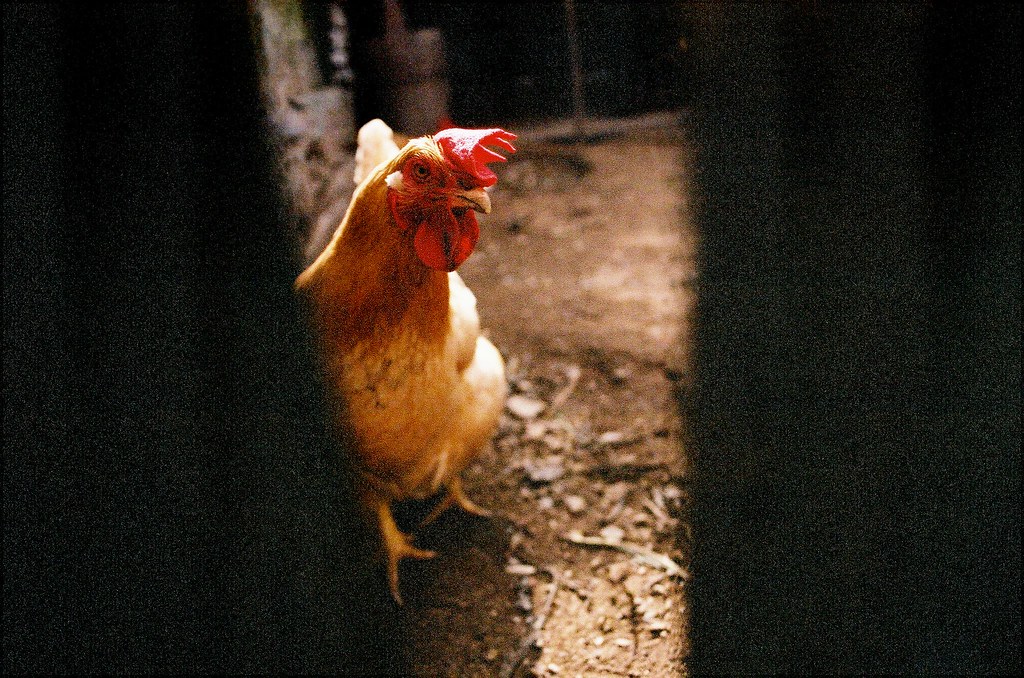 |
| What a cock. |
A couple of hours out of Shanghai and we see a tourist sign pointing off the highway to a place called "Grand Gorge". That sounds quite impressive - and knowing the way Chinese like to do mountains and rivers I suspect it should be quite a treat. Turning off of the main highway and handing over some kuai at the obligatory toll-booth we cruise through a small town that is spectacularly one giant roadwork.
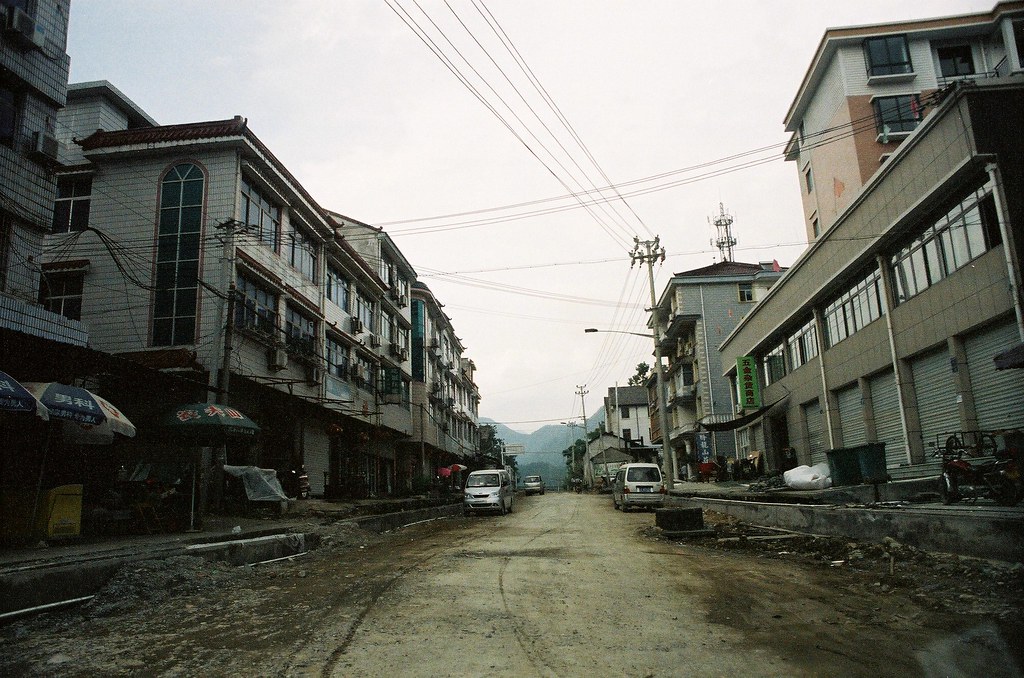 |
Quite possibly the main street of Auckland, NZ.
I think you can see John the blacksmith on the left. |
After driving down a bumpy under-construction dirt road for thirty minutes along a river in a ravine, it becomes apparent that this was it, so we make a u-turn, avoiding the gravel trucks and road-workers and head back for the highway. Perhaps they need to give the
Grand Gorge a new name?
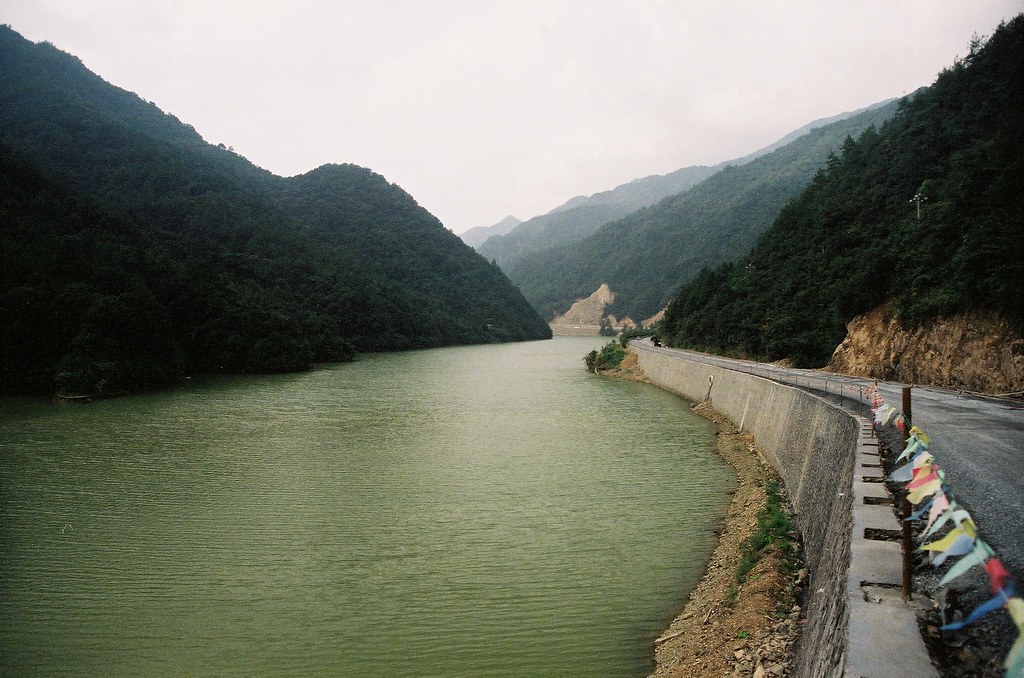 |
| Average Gorge, China. |
Heading further inland into Jianxi Province (about 6-7 hours from Shanghai) and it becomes apparent that construction is happening
everywhere in this part of China. Apartment blocks, factories, shops, bridges, roads - the roadside is peppered with them for the entire journey. Construction is especially dense anywhere near a major town or city - the local governments are obviously expecting large populations of people to move in soon.
One of the things I find fascinating about rural China is the insistance (perhaps out of necessity) that everything be done via manual labour. If something needs moving, it's moved by hand. If a seed needs sowing, it's done by hand. If a crop needs reaping, it's done by hand. It's a
very common sight to see an old man or woman in their 70s walking down the road with an antique looking hoe slung over their shoulder. Seemingly the only modern technology around here are the throngs of motorbikes and scooters - driven by old and young alike. Some of the more pimpin' chaps zip around on their scooters with their ladies perched on the back.
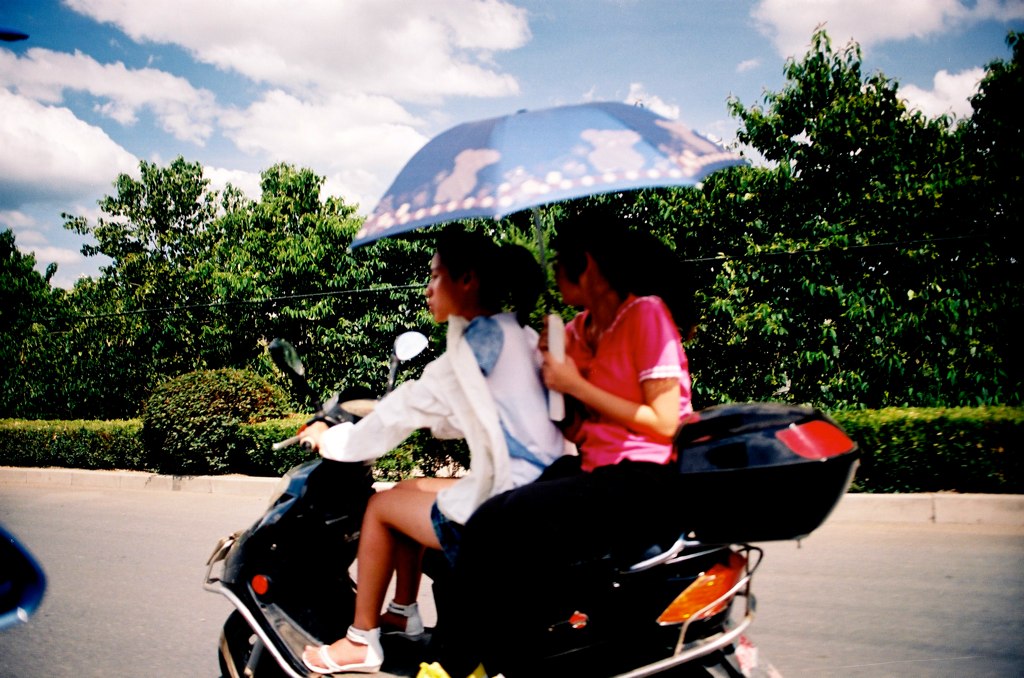 |
| Always remember to bring an umbrella |
Arriving at Li Kang late in the afternoon, we find that the village is closed for -- reasons I probably shouldn't say on here - and so we set off to find the next point of interest - Sixi village. It's getting late and we don't find it until after dark. And boy is it dark out here in the countryside - the murky black sporadically pierced in the distance by sheet lighting off on the horizon. Asking a man walking along the side of the road for directions he assures us that we've found it, and insists that we should come stay in his guest house. We're the only tourists in town tonight so we have a choice of one of two rooms - one with three large black spiders on the wall, and one without.
 |
| We'll take the one without thank you. |
After a delicious dinner consisting of an egg and tomato dish and beans with miscellaneous, lights go out early so we can get up at sunrise and wander the village.
 |
| Good morning Village! |
So much for getting up at sunrise - it's 8am by the time we rise from our slumber after a hard day's drive. Breakfast is ready. Delicious egg and noodles for breakfast. It's worth noting at this point that all of the food here is "farm food" - fresh off the farm - healthy
and delicious!
 |
| The head chef/husband/owner of the guest house - hard at work. |
Beautiful green fields lie directly out the back door of the guest house. We wander around the village before the tourists arrive. It's very hot. Trays of vegetables and spices are left out in the sun to dry. The village is quite picturesque - flanked by green fields on either side, old houses squatted next to one another. Running down one side is a small river - at one end powering a water-wheel - the means to washing clothes at the other, and with a lovely wooden bridge in the middle crossing to a plantation on the other side. Luckily the only other tourists we run into are a small group of young Chinese.
 |
| Flanking Crops |
 |
| Drying veges and spices |
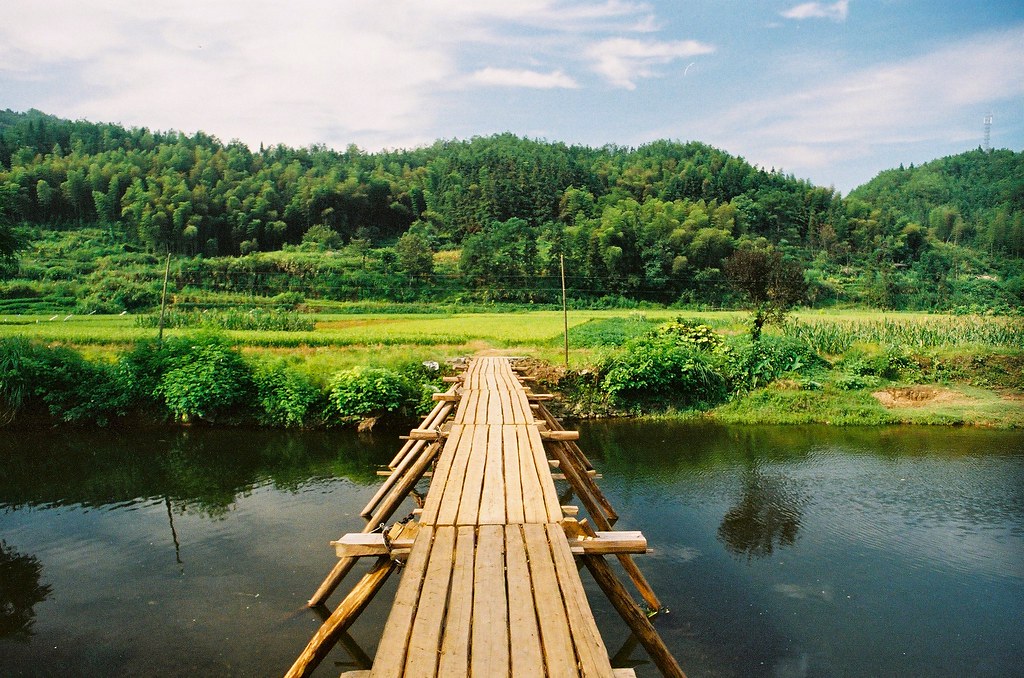 |
| This group of Chinese is so small you can't even see them. |
Down at one end of the village, we come across a very old man coming the other way. He looks about 120 years old - but he's still going - slowly. Overtaking on the inside, and venturing into an old derelict house, there are random pieces of broken furniture and equipment strewn about as the grass creeps in through a broken door.
 |
Don't look behind you.
|
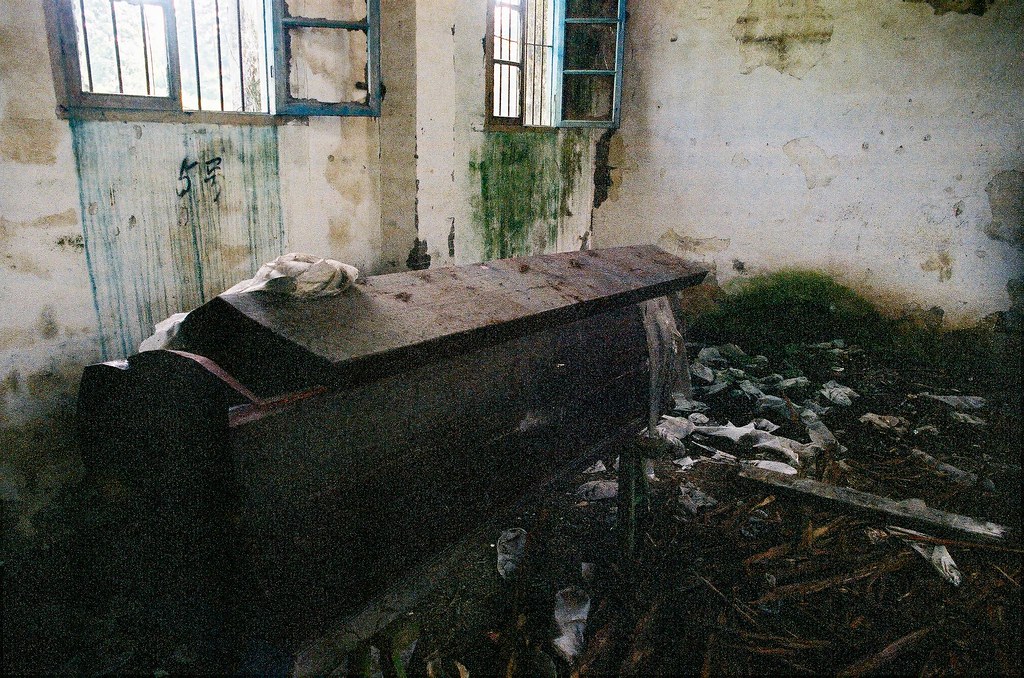 |
| I said don't |
In the corner of the derelict house is a coffin - under construction. I can't help but think it's for the old man.
After exploring the first village we head off down the road for ten minutes and arrive at another historic village - Yancun. This one is just like the first one but
different.
As we arrive, a throng of children show up banging on the window shouting. They want to be our tour guides for the village. No thank you we keep insisting. But you will miss out on learning about the 99 different types of door! No thank you.
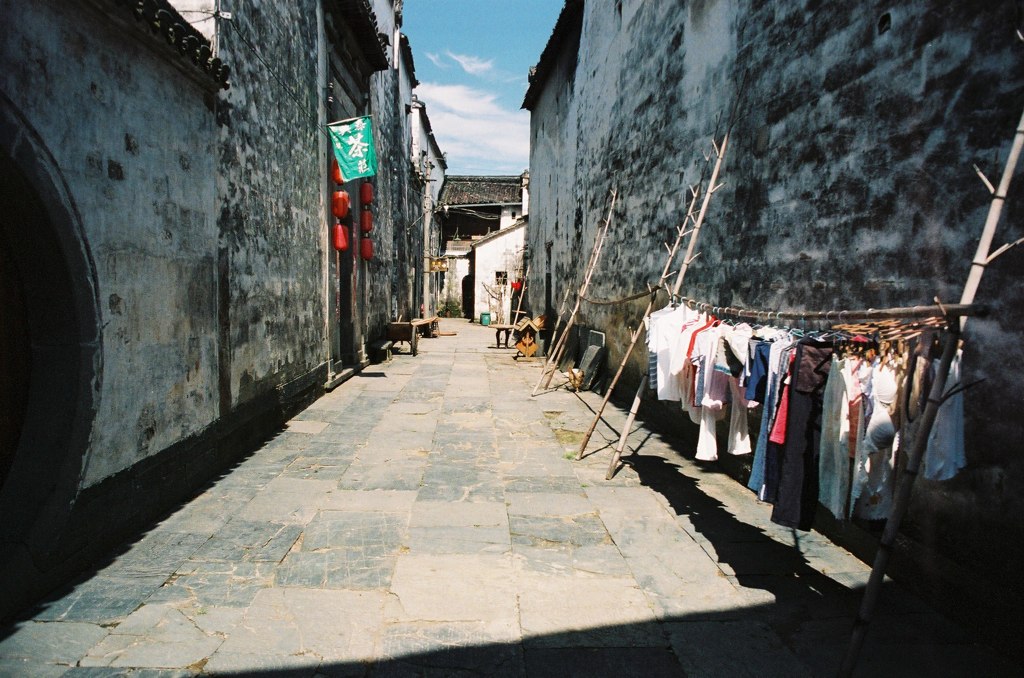 |
| Look! No doors! I should have payed for the doors. |
The village is similar to the last one, but this one has a big old bridge on it. The locals are sitting on the bridge in the shade away from the heat - chatting loudly.
That's one of the great things about these villages - not only are they a historical tourist attraction - the locals still live, cook, eat, and sleep and whatever country folk do when they get bored after dark in these ancient houses.
More pics of the villages can be found
here













No comments:
Post a Comment